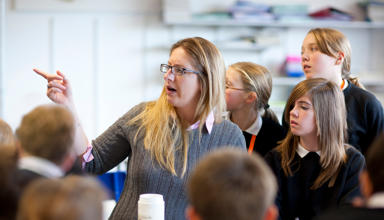The Cabinet Secretary for Education is expected to announce details of her response to a review of the way children and young people are taught about issues surrounding relationships and sexuality. Kirsty Williams will make a statement in Plenary on Tuesday (22 May 2018) following the report of an expert panel.
The Cabinet Secretary established the Sex and Relationships Panel in March 2017. Professor Emma Renold, Professor in Childhood Studies at the School of Social Sciences at Cardiff University, was announced as its Chair. The panel was tasked with identifying issues and opportunities to support Sex and Relationships Education (SRE) in the current curriculum and provide advice and recommendations on how it should be incorporated into the new Curriculum for Wales, which is currently under development.
The expert panel’s report (PDF 1.53MB) was published in December 2017 and made 11 recommendations, which are listed on pages 22-23. They centre on making SRE a statutory part of the new curriculum, giving it an equal status with other areas, and providing greater training and support for teachers.
The Cabinet Secretary’s initial response
Kirsty Williams issued a statement on 13 December 2017, alongside the publication of the report, when she said she would consider the recommendations. The Cabinet Secretary is now expected to provide her response although she has already given a clear indication that this is an important subject:
I am committed to ensuring that this important subject is delivered in schools to the highest standard and teachers and staff are appropriately equipped to meet the needs and experiences of their learners as they grow and mature. (…)
It is therefore more important than ever that schools are able to support pupils through developmentally appropriate, factual, high quality Sex and Relationships Education and access to further advice and specialist support.
The Cabinet Secretary added that the expert panel’s report “will provide invaluable evidence for the Pioneer Schools as they explore curriculum structures and wider whole school approaches around SRE”.
Current position within the curriculum
Under section 101(c) of the Education Act 2002, all maintained secondary schools are required to include, as part of the ‘basic curriculum’ of the school, sex education for registered pupils. Primary schools are not required by the 2002 Act to provide sex education as part of the ‘basic curriculum’, although they can do so at their own discretion.
Parents have the right to withdraw their children from any element of sex education that is not part of the national curriculum. However, where specified within national curriculum programmes of study and subject orders (for example Science), pupils must be taught such elements of sex education.
Sex education’s status within the basic curriculum means that, while it is compulsory for secondary schools to provide, how and what should be delivered is not prescribed unlike with national curriculum subjects. The Welsh Government issued non-statutory guidance in 2010, which lists the aspects of SRE education which should be delivered within Personal and Social Education (PSE), referencing the (also non-statutory) Personal and social education framework for 7 to 19 year olds in Wales. Like SRE, PSE is a requirement of the basic curriculum, which means it is compulsory for schools to provide it but they have discretion over how to do this.
The expert panel has recommended a change in the terminology from ‘sex and relationships education’ to ‘sexuality and relationships education’, drawing on the World Health Organisation’s rights and equality based approach. Amongst the findings of the expert panel were:
- “The current law and guidance on SRE is outdated”;
- “Current provision of SRE in schools is limited”;
- “There is a gap between children and young people’s lived experiences and the content of SRE”; and
- “SRE as a curriculum area is often poorly resourced, given low priority in schools, leading to uneven and unequal provision”.
The new Curriculum for Wales
A new Curriculum for Wales is being developed following Professor Graham Donaldson’s review of curriculum and assessment arrangements in Wales, Successful Futures (PDF 1.59MB). One of the six new Areas of Learning and Experience (AoLE) will be Health and Wellbeing, part of which will replace the current PSE and SRE frameworks.
The Welsh Government is currently working with a network of Pioneer schools to design the six AoLE and develop the new curriculum. The Health and Wellbeing Working Group produced a report in December 2017 (PDF 3.41KB) setting out the high-level design of the Health and Wellbeing AoLE to date and ‘what matters’. An earlier executive summary report in July 2017 (PDF 630KB) said that the working group was working with Professor Renold’s expert panel to determine how SRE would form part of the Health and Wellbeing AoLE.
The Cabinet Secretary for Education has previously confirmed that healthy relationships and sex education will be included in the Health and Wellbeing AoLE (Children, Young People and Education Committee, 12 January 2017, paras 157-162 PDF 153KB).
The expert panel recommended that SRE should be a statutory part of the new curriculum for all schools and that it should have an equal status to other areas within the Health and Wellbeing AoLE, and that this particular AoLE should have an equal status to the other five AoLEs.
The Violence against Women, Domestic Abuse and Sexual Violence (Wales) Act 2015
Healthy relationships education was a key issue during the Assembly’s legislative and post-legislative scrutiny of the Violence against Women, Domestic Abuse and Sexual Violence (Wales) Act 2015.
The 2012 White Paper (PDF 250KB) preceding the legislation proposed that the Bill would ensure that education on healthy relationships was mandatorily delivered in all schools. But the final Act only contained a requirement (in section 9) for local authorities to report on how they are addressing violence against women, domestic abuse and sexual violence within their education institutions.
During post-legislative scrutiny (PDF 2.98MB) of the Act in 2016, the Equality, Local Government and Communities Committee concluded that “compulsory education is key to preventing violence against women, domestic abuse and sexual violence in the first place”. It went on to say that “without a statutory requirement for schools to deliver healthy relationships teaching, while some schools will continue to address this issue effectively, others will opt out, as is currently the case”.
The Committee recommended that the Welsh Government should “commit to including teaching about healthy relationships in the new curriculum under the ‘Health and Well-being’ Area of Learning and Experience (AoLE)”.
The Welsh Government partially accepted (PDF 171KB) the recommendation, saying that work on the Health and Wellbeing AoLE would consider approaches to covering this in the new curriculum.
The Committee also recommended that reporting under section 9 of the Act should begin in the 2017/18 academic year. The Welsh Government responded to this recommendation by saying “there may be opportunities to obtain information and data on what education settings within local authorities are currently undertaking with regards to Education provision stemming from the Act from external organisations”.
However in an update to the ELGC Committee (PDF 676KB) from the Leader of the House in February 2018, it was confirmed that regulations under section 9 would not be made because of the ongoing work on the new curriculum.
The expert panel on SRE education found that “there is a lack of awareness and education on violence against women, domestic abuse and sexual violence” and that few schools are aware of the 2015 Act and associated guidance and resources. The panel cited research from the School Health Research Network in 2015 saying that “only half of secondary school students in Wales agree that their school teaches them who to go to if they, or a friend, experiences violence within a relationship”.
How to follow the Cabinet Secretary’s statement
The Cabinet Secretary’s statement and the subsequent questions from Assembly Members are scheduled for Tuesday 22 May 2018. The Plenary session will be broadcast on Senedd TV and a transcript will be available on the Assembly’s Record of Proceedings.
Article by Michael Dauncey and Hannah Johnson, National Assembly for Wales Research Service






